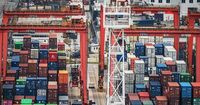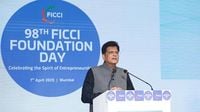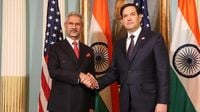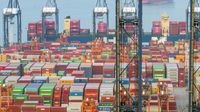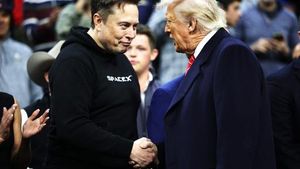As global economic tensions rise and protectionist policies take hold, India is making strategic moves to secure its trade interests. On April 7, 2025, Commerce Minister Piyush Goyal announced that India is open to bilateral trade agreements with developed nations. His remarks come amid fears of a potential trade war between India and the United States, which could lead to significant trade diversion, thereby presenting opportunities for India and other countries.
Goyal emphasized that the Indian industry is highly competitive and capable of thriving in a rules-based environment. He stated, "The Indian industry is very competitive. They can beat any competition in the world if everyone sticks to the rules of the game. It’s the irregularities and unfair trade practices where we need protection through tariffs." He also noted that India has considerable flexibility in negotiating terms with developed nations, saying, "I have absolutely no hesitation in saying that, bilaterally, we have a lot of elbow room when working with developed countries—where India has equal opportunities." This flexibility is crucial as the global economic landscape shifts.
Goyal's comments coincide with a wave of protectionist measures from the US, particularly under former President Donald Trump's administration, which are expected to accelerate India's trade negotiations with the UK and the European Union. European Commission President Ursula von der Leyen expressed openness to dialogue, stating that Europe is "always ready for a good deal" and has proposed a zero-for-zero tariff deal on industrial goods to Washington.
Meanwhile, South Africa is also looking to expand its trade relations with India and China in response to potential tariffs imposed by the US. Deputy President Paul Mashatile indicated that despite being one of the US's biggest trading partners, South Africa should intensify its trade relationships elsewhere. Speaking at an event hosted by the Ahmed Kathrada Foundation, Mashatile said, "The geopolitics at the moment really requires that we should be engaging other nations as well." He highlighted the importance of solidarity and economic development not only for South Africa but for the entire continent.
South Africa's G20 presidency this year is viewed as a significant opportunity to promote trade and economic cooperation across Africa. Mashatile pointed out that the African Continental Free Trade Agreement is crucial for enhancing trade relations within the continent. He reassured that South Africa would not impose retaliatory tariffs following the US's announcement of a 30% tariff on South African goods, despite strained diplomatic relations over the Israel-Palestine conflict.
In a related development, External Affairs Minister S. Jaishankar and US Secretary of State Marco Rubio discussed advancing trade talks between India and the US. This conversation came shortly after the US announced a 26% tariff on Indian imports, which has rattled global markets. The Indian stock market saw declines of over 3% in response to these developments.
Jaishankar expressed optimism about the ongoing negotiations, stating on social media, "Good to speak with US Secretary of State Rubio today. (We) agreed on the importance of the early conclusion of the Bilateral Trade Agreement." The urgency of these discussions is underscored by a study from the Global Trade Research Initiative (GTRI), which estimates that India's exports to the US could decline by $5.76 billion this year due to the new tariffs.
India's government is reportedly exploring options to negotiate a suspension of the 26% tariffs until a Bilateral Trade Agreement is finalized, which is expected to be completed by fall 2025. This strategy aims to protect India's export interests while engaging in meaningful dialogues with US trade officials. The plan may involve seeking temporary relief for specific high-performing export categories, such as textiles and electronics.
Despite the challenges posed by the new tariffs, India has remained committed to securing favorable trade terms. The first round of face-to-face discussions regarding the Bilateral Trade Agreement took place from March 26 to 29, 2025, and further negotiations are anticipated. The Indian government is keen to finalize these discussions to mitigate the adverse effects of the tariffs on its economy.
In FY22, India's merchandise exports to the US were valued at $75.6 billion, increasing to $78.3 billion in FY23. However, FY24 saw a slight dip to $77.5 billion, primarily due to supply chain disruptions. The US holds a trade deficit with India, which was $35.32 billion in FY24, indicating a complex interdependence between the two economies.
Trade experts warn that the new tariffs could have significant repercussions for various sectors. Exports of gold jewelry and polished diamonds, valued at $11.9 billion last year, are projected to drop by $1.82 billion due to the new tariffs. Similarly, electronics and smartphone exports, which had surged to $14.4 billion, are expected to decline by $1.78 billion as the tariffs erode profit margins.
Former Union Commerce Minister Anand Sharma urged the Indian government to maintain a calibrated approach in its trade engagements and avoid yielding to pressure from the Trump administration. He emphasized the importance of safeguarding national interests while fostering goodwill among developing countries.
As the global trade landscape continues to evolve, India’s proactive stance in pursuing bilateral agreements with key partners like the US, the UK, and the EU will be critical. The current geopolitical climate presents both challenges and opportunities, and India aims to navigate this landscape by leveraging its competitive advantages and fostering international collaborations.
